#walter reisch
Text

Director Walter Reisch (center) talking to Jean-Pierre Aumont and Yvonne De Carlo on set of SONG OF SCHEHERAZADE (1947)
20 notes
·
View notes
Text
Check the release year on Titanic before voting!
Top two vote-getters will move on to the next round. See pinned post for all groups!
#best best screenplay tournament#oscars#academy awards#best original screenplay#the sting#david s. ward#titanic#charles brackett#richard l. breen#walter reisch#divorce italian style#ennio de concini#peitro germi#alfredo giannetti#tender mercies#horton foote#the defiant ones#nedrick young#harold jacob smith#poll#polls#brackets#bracket tournament
7 notes
·
View notes
Text
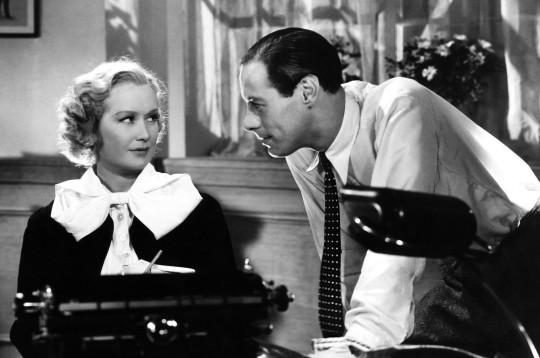
Miriam Hopkins-Rex Harrison "Los hombres no son dioses" (Men are not gods) 1936, de Walter Reisch.
3 notes
·
View notes
Text
Let's Play Ping Pong With Peter Lorre
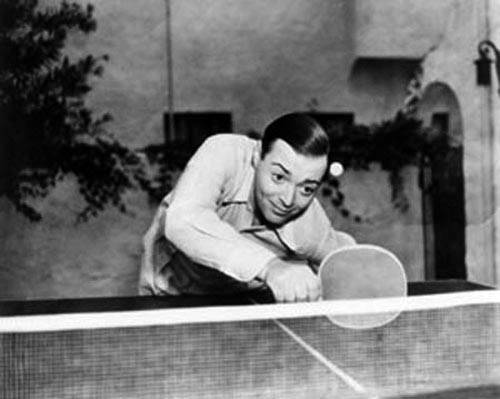
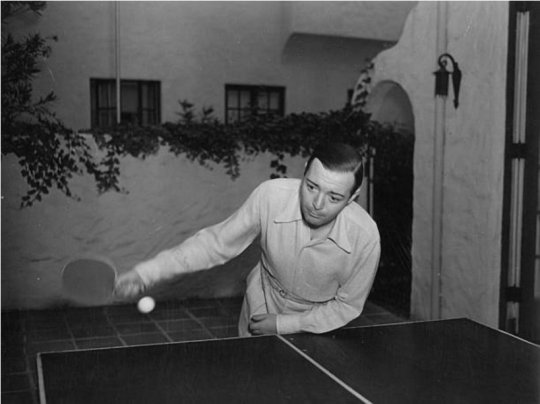
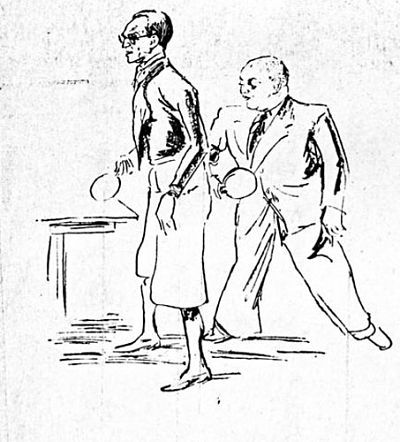
Just felt like collecting the Peter Lorre ping-pong pictures in one place. Any others?
The bottom one is Conrad Veidt + Peter Lorre during the simultaneous shooting of the three versions of "F.P.1 antwortet nicht," 1932 (Peter was in the German version, Conrad in the English; Charles Boyer was in the French):
"After dinner, there was only one diversion—Ping-Pong. Much to everyone’s amusement, the six-foot-five Veidt and the five-foot-five Lorre—who tipped the scale at the same undisclosed weight—paired up. 'And these two guys, the one who played ‘Caligari’ and the other one who played the mass murderer in M became a team in Ping-Pong that was unbeatable,' said [screenwriter Walter] Reisch. 'It was not just if we win tonight, it was a matter of life and death to win the tournament. Not for the money, but there was a gala reception afterwards and a medal. And these guys played together like a team, with beautiful timing.'"
And not too much later:
News of Lorre’s arrival in Los Angeles had preceded him by over a month. “In all of the newspapers here, we read of his coming,” Elisabeth Hauptmann wrote Walter Benjamin in Paris. “One has to congratulate the man who engaged the ‘genius actor.’” Hollywood extended a warm welcome to the Lorres. Invitations summoned Peter and Celia to lavish Viennese and Tyrolean dinner parties, where they mixed with old friends such as Fritz Lang, G.W. Pabst,
Billy Wilder, and Franz Waxman and met new ones, among them Jean Negulesco, Delmer Daves, Paul Muni, and Olivia de Havilland. The Friedrich Hollaenders also enrolled Lorre—along with Ernst Lubitsch, Conrad Veidt, and Josef von Sternberg—for their Sunday afternoon Ping-Pong tournaments."
All quotes from "The Lost One: A Life of Peter Lorre" by Stephen D. Youngkin.
56 notes
·
View notes
Text




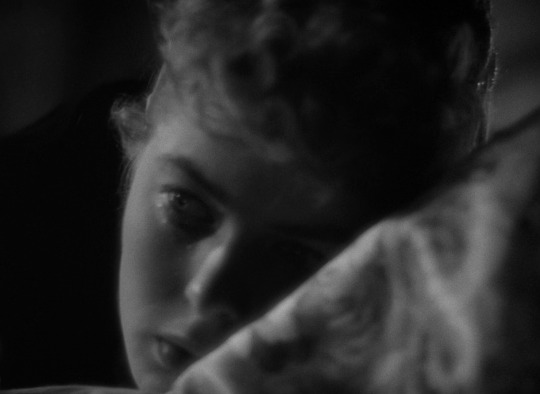
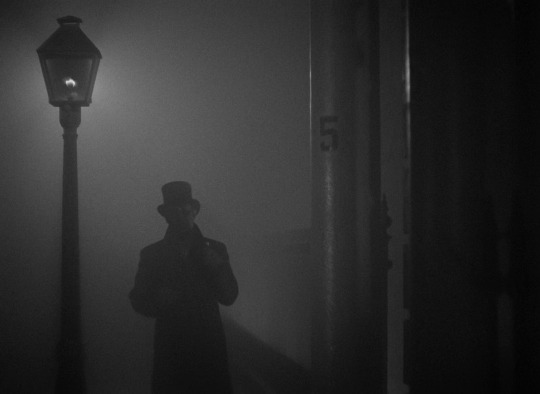



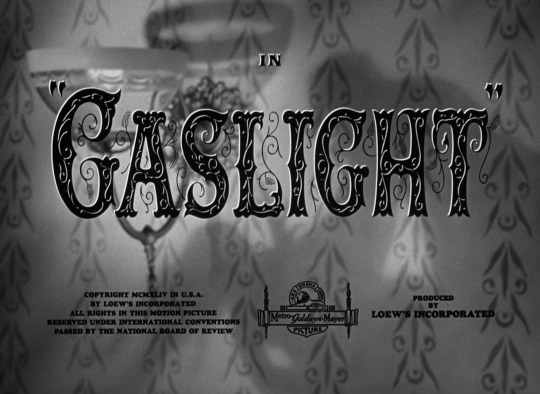
Gaslight, 1944.
Dir. George Cukor | Writ. John Van Druten, Walter Reisch & John L. Balderston | DOP Joseph Ruttenberg
6 notes
·
View notes
Text

Marilyn Monroe in Niagara (Henry Hathaway, 1953)
Cast: Marilyn Monroe, Joseph Cotten, Jean Peters, Max Showalter, Denis O'Dea, Richard Allan, Don Wilson, Lurene Tuttle, Russell Collins, Will Wright. Screenplay: Charles Brackett, Walter Reisch, Richard L. Breen. Cinematography: Joseph MacDonald. Art direction: Maurice Ransford, Lyle R. Wheeler. Film editing: Barbara McLean. Music: Sol Kaplan.
Niagara was one of three movies starring Marilyn Monroe that were released in 1953. The other two, Gentlemen Prefer Blondes (Howard Hawks) and How to Marry a Millionaire (Jean Negulesco), were hits, confirming that Monroe was a peerless comic actress. But Niagara wanted her to be a film noir siren. She had done earlier turns in legitimate film noir, a small role in The Asphalt Jungle (John Huston, 1950), larger ones in Clash by Night (Fritz Lang, 1952) and Don't Bother to Knock (Roy Ward Baker, 1952), so this time 20th Century-Fox decided to go all out in exploiting her as a femme fatale. There are many things wrong with Niagara, one thing being that it can't quite decide whether it's a noir thriller or a Technicolor travelogue about the eponymous falls and their various tourist attractions. But what's most wrong about it is its misuse of Monroe, who is not even the real lead character in the film: Her role is decidedly secondary to that of Jean Peters. And she is grotesquely exploited in her part as Rose Loomis, unhappily married to a mentally unstable man (Joseph Cotten) and plotting to have her lover (Richard Allan) bump him off. The studio can't resist dressing her in skin-tight clothes, with high heels that make it impossible for her to walk without bumps and grinds, and flaming red lipstick that's obviously freshly put on even when she's supposed to be waking up in the morning. A producer less under the control of the studio than Charles Brackett (who also wrote the clunky screenplay with Walter Reisch and Richard L. Breen) might have made Rose into a credible character, but here she's only an adolescent boy's fantasy. Still, even a misused Marilyn is better than no Marilyn at all, as we find out two-thirds of the way through the movie when the focus shifts to the character played by Peters and her grinning ass of a husband (Max Showalter), and we have nothing to marvel at but the Falls. In the hands of a Hitchcock, Niagara might have been a success, but Henry Hathaway directs as if he's bored by the whole thing.
19 notes
·
View notes
Text
An old movie with a very relevant name.
Script below the break.
Hello and welcome back to The Rewatch Rewind! My name is Jane, and this is the podcast where I count down my top 40 most frequently rewatched movies over the last 20 years. Today I will be discussing number 14 on my list: MGM’s 1944 psychological thriller Gaslight, directed by George Cukor, written by John Van Druten, Walter Reisch, and John L Balderston, based on the play by Patrick Hamilton, and starring Ingrid Bergman, Charles Boyer, and Joseph Cotten.
So first of all, if you’re thinking, “Gaslight? As in, to deny someone’s reality to the point that they can no longer trust their own perceptions?” then, yes, you’re absolutely correct: this movie (and the play it’s based on and the 1940 British film it’s a remake of) is where that term comes from. So I’m just going to give a blanket content warning for this whole episode: I will be talking a lot about psychological and emotional abuse. This is an incredibly well-made movie, which is why I keep revisiting it, but I recognize that not everybody is in the right place to hear stories about gaslighting, so please, take care of yourself, and skip this episode if you think it’s going to cause you distress.
That being said, I truly have no idea why “gaslighting” suddenly became a popular buzzword in the last 10 years or so, or how it has evolved to be misapplied to any form of lying. I’ve even heard people talk about how someone is “gaslighting” them when they merely disagree about something. So despite how incredibly dark and disturbing this movie is, I really think everyone should watch it, if for no other reason than to learn how to use the term correctly. But there’s obviously a lot more to it than that, which I will get into. But first, my traditional plot summary:
When her aunt and guardian, a famous opera star, is murdered in their London home, young Paula Alquist (Ingrid Bergman) is sent to Italy to train as a singer. Ten years later, she is swept off her feet by her new accompanist, Gregory Anton (Charles Boyer), and after knowing each other only two weeks, they get married. Though she is still haunted by her aunt’s unsolved murder, upon hearing that Gregory has always wanted to live in London, Paula suggests that they move into her old house. As they settle in, Gregory’s behavior gradually changes, and Paula begins to feel like she is losing her mind.
The main thing I remember about the first time I watched this movie was thinking it wasn’t a very good mystery, since it’s pretty obvious fairly early on who the bad guy is. But by the end it became clear that it was never meant to be a mystery, but rather a map of red flags to watch out for, as well as a surprisingly sympathetic portrayal of how easy it can be to ignore them until it’s too late. Or, I guess I should say, almost too late, since, spoiler alert: the movie does have a mostly happy ending. Anyway, I had never seen a movie like this before and it fascinated me. I watched it twice in 2003, once in 2004, once in 2006, once in 2007, twice in 2008, three times in 2012, once in 2013, once in 2014, twice in 2015, twice in 2016, once in 2017, once in 2018, once in 2020, twice in 2021, and once in 2022. I also saw the 1940 version once in 2006. I don’t remember much about it other than I thought it was pretty good, but the remake was better. And a big part of that is because of the cast of the remake. One of my 2015 views of the remake was part of my watching through Best Actress winners project because Ingrid Bergman won the first of her three Oscars for this film. Apparently at the time I ranked this performance as the 7th best to win that award, and now if anything I feel like that was too low. The more I rewatch this movie, the more impressed I am by what a difficult job she had and how thoroughly she crushed it.
Paula is an incredibly complex character who undergoes a significant emotional journey. At the beginning, though she’s definitely still haunted by the trauma of her youth, she’s mostly happy and hopeful and vivacious. And then all of that slowly dims as Gregory’s manipulations escalate, almost as if she is a gas light that he’s turning down. That’s not why the movie is called Gaslight, though; it’s called that because one of the early signs that something sketchy is going on is when Paula starts to notice lights dimming as if someone turned a new light on somewhere else in the house, but nobody else seems to notice this and she can’t find a good explanation for it. But watching Paula go from a lively, lovestruck newlywed to basically a zombie struggling to find a shred of reality she can trust also feels like watching a gas light flame go down. And it would have been so easy to either overdo or undersell this descent into confusion, but Ingrid Bergman perfectly balances every moment. You can see Paula starting to doubt herself more and more as her actions and words become more hesitant and her looks become more vague, until she begins to resign herself to the fact that Gregory must be right, she must be insane, there’s nothing more she can do. It’s so painful and heartbreaking that I desperately want to reach through the screen and comfort her and tell her what’s really going on. And then, just when I almost can’t stand it anymore, Joseph Cotten shows up to do that for me. He plays Inspector Brian Cameron of Scotland Yard, a childhood fan of Paula’s aunt who happens to see Paula one of the few times she’s out with Gregory in London, which leads him to reopen the cold case of her aunt’s murder and figure out what’s going on just in time to help Paula. The implication that Paula needs a man to rescue her is one thing I don’t love about this movie, but at the same time I think it’s important to acknowledge that Gregory was so effective at – for lack of a better term – gaslighting her that she could not have escaped that situation without help.
Not to take any of the credit away from Bergman for her stellar performance, but I do think it helped that George Cukor was the director. Longtime listeners may recognize his name from Holiday, which was number 33 on this list, and Adam’s Rib, which was number 27, both of which have significantly lighter tones. Gaslight feels much more like an Alfred Hitchcock picture than a George Cukor one. Cukor apparently didn’t like being referred to as a “woman’s director,” but he had a reputation for his ability to coax great performances out of actresses, and this is certainly no exception. In order to help Bergman keep track of Paula’s gradual descent toward madness while shooting out of order, Cukor would tell her the whole plot up to the scenes they were filming each day, which Bergman initially resented, but then he stopped doing it for a few days and she realized how helpful it had been, and they went back to doing it that way. I do think Ingrid Bergman would have been great in this role regardless of who the director was, but George Cukor helped elevate her to the best she could possibly be.
While Bergman’s performance is far and away my favorite aspect of this movie, the rest of the cast is also phenomenal, albeit rather small. It definitely has that based-on-a-play feel of limited locations and few characters, although that also works very well with the story. Part of Gregory’s strategy is to cut Paula off from the rest of the world so she won’t have a safety net. Consequently, for most of the film she only interacts with him and their two servants: the kind but mostly-deaf cook, Elizabeth, played by Barbara Everest, and the saucy, flirtatious maid, Nancy, played by none other than 18-year-old Angela Lansbury in her film debut, both of whom are absolutely perfect in their roles. I love Everest’s delivery of “I see just how it is” when Gregory is trying to keep Elizabeth on his side without realizing that she’s always been firmly on Paula’s. And Lansbury embodies the exact attitude required for Nancy: flirtatious toward Gregory, disdainful toward Paula, totally oblivious to how she’s being manipulated until the end – all conveyed with every look she gives and line she speaks as if she’s a veteran actor. It comes as absolutely no surprise that she went on to have such a long and successful career, with this as her first screen performance. She was even nominated for an Oscar! And then there’s the neighbor Miss Thwaites, played by Dame May Whitty, who adds some much-needed levity with her “diggy biscuits” and morbid curiosity about the house in her square where there was a “real murder!” Joseph Cotten’s role is honestly pretty bland – kind of the film noir version of a classic Disney prince, in a way – but he makes the most of it. And then there’s Charles Boyer, giving one of the best creepy villain performances I’ve ever seen, which was also Oscar-nominated. He starts out just sort of vaguely unsettling, raising one or two red flags right off the bat, but like, he could still be okay, and then by the end he is full-on terrifying. He has this amazing stone-faced look that makes your blood run cold. There’s this one moment in particular, kind of toward the middle, when Miss Thwaites and Inspector Cameron (posing as her nephew) have tried to visit them, and Gregory tells Nancy to send them away. Paula wanted to let them in but he freaked out so she backed down, and then after Nancy leaves she again says she wanted to see them, and he’s like, “Oh, why didn’t you say so?” and it makes me want to scream. Then he tells her she didn’t have time to see them because they’re going out to the theater, and Paula’s like, “I didn’t know that…or did I forget?” and Gregory, facing the camera with his back to her, opens his mouth to respond, and then stops and waits for her to dwell on that for a few more seconds before he tells her that no, this is a surprise, and both his face and her face are so perfect there, I love it and hate it so much. Like, I love it from a “this movie is so well acted” perspective, and I hate it from a “this character is a horrible human being” perspective. And then Paula gets overly happy, since she’s been trapped in the house for so long that him letting her go out seems like a wonderful gift. But then he “notices” that a picture is missing from the wall, and makes her think she hid it, and they end up not going out because she’s “too unwell.”
That’s the main way he manipulates her: by moving things and making it look like she took them. What’s particularly interesting about the way the movie shows this is we never actually see Gregory taking any of the things, but it is nevertheless clear that he has been. But he is so insistent that she’s doing it that we can easily believe that Paula wouldn’t suspect him, or that if she did, she would have significant doubts. And even if she did figure it out, it’s not like there’s anything she can do about it. She’s in London for the first time in a decade, she doesn’t know anyone, she doesn’t have anywhere to go, and she’s not sure she can trust her own mind. And I think it’s so important that the movie at no point faults her for ending up in that situation or for not being able to leave. The movie also gives no indication that Gregory is physically harming Paula, but leaves the audience in no doubt that he is an abusive husband. And I feel like the messages that abuse doesn’t have to be physical and that it’s never the victim’s fault are still too rare in media today, let alone nearly 80 years ago. I feel like back then most unhealthy relationships in movies were in the His Girl Friday vein of “they’re kind of both abusing each other so it’s fine” or would find other ways for excusing or explaining the abusive behavior, like “the abuser was drunk” or “the victim was asking for it” or what have you. And if they weren’t like that, the victim usually ended up dead. In Gaslight, Gregory has no excuse. I mean, he does have a reason, but it’s a terrible reason that in no way justifies his actions. And Paula not only survives, but also gets an incredibly satisfying confrontation with Gregory after Brian and another policeman have tied him up. When the police leave them alone together, Gregory pleads with her to get a knife and cut him free, and for a moment you think she’s actually going to help him, but she gets her revenge by pretending she can’t find the knife and saying she’s too insane to help him, forcing him to admit that he has lied to her and she isn’t actually mad. And she wraps up her great payback with: “If I were not mad, I could have helped you. Whatever you had done, I could have pitied and protected you. But because I am mad, I hate you. Because I am mad, I have betrayed you. And because I'm mad, I'm rejoicing in my heart, without a shred of pity, without a shred of regret, watching you go with glory in my heart!” So she turns his gaslighting around on him, and it’s amazing. Although I must admit that right after that when she cries, “Mr. Cameron! Take this man away!” is the one part when I feel like Ingrid Bergman overdoes it just a little bit and gets too melodramatic, but after everything Paula has been through, she deserves as many melodramatic moments as she wants.
I would prefer it if the movie didn’t conclude with the implication that Paula is going to end up romantically involved with Brian, but again, she deserves all the happiness she can get, and if that’s what’s going to make her happy, I’m all for it. And I guess we can claim Miss Thwaites as aroace representation, since she seems to be an old maid with no interest in romance. This movie also speaks to my aromanticism and asexuality in a different, unique way. Because to a certain extent, being aroace in an allonormative, amatonormative society kind of feels like the entire world is gaslighting you. Of course, I don’t mean to imply that my experiences have been anywhere near as horrendous as someone like Paula’s – having your reality cruelly and intentionally twisted by a partner is on an entirely different level from not quite fitting in with the dominant culture’s concept of reality. Still, being constantly bombarded with the message that all mature humans frequently experience sexual and romantic attraction, and that a universal top life goal is to find a partner you’re attracted to that way, when you don’t feel those attractions and don’t desire that kind of partner, is incredibly confusing and disorienting. Once you become an adult, or even a teenager, people start giving you knowing looks when they hear you’ve been hanging out with a friend one-on-one, especially if that friend happens to be of the opposite sex. And you don’t think you like any of your friends “that way” but you also don’t really know what liking someone “that way” feels like so you start to think maybe you don’t know your own feelings. And if you’re lucky, your brain subconsciously decides that you do have crushes like a normal person, they’re just always on movie stars, most of whom are dead, which you realize is weird, but it’s an understandable kind of weird. Nobody believes you when you say you don’t have a crush on anybody, but if you show them a picture of Cary Grant and say, “I have a crush on him,” that makes sense to them. And so you end up becoming convinced that you’re experiencing types of attraction that you’re not, to the point that when you first hear about asexuality you don’t even consider the possibility that it could describe you. And of course, when I say “you” I mean “me”; I can’t speak for all aroaces, although I do think most of us experience some form of that confusion before we figure out that our identity exists. I feel like there’s a relatively widespread perception that aromantic and/or asexual people are just single allos who want to feel special by giving themselves a label, but for me, the opposite is true. Using the aroace label makes me feel less special, because now I know there are other people out there like me, after spending so much time trying to play along with the attraction I thought I was supposed to be feeling. It’s honestly been kind of difficult to unlearn this, to teach myself how to even recognize, let alone trust, what I’m actually feeling versus the socially acceptable way to be feeling about other people.
It’s weird because, looking back, it’s so obvious to me that I was faking crushes, that I was just parroting things I’d heard when I talked about them, that I was just smiling and nodding when people would say things like, “Isn’t that person hot?” But at the time, I absolutely could not admit that, even to myself, because I felt like, in order to be human, I must be experiencing what I’d been led to believe were universal human emotions that went along with sexual and romantic attraction. Back in 2013 I blogged about all the movies I’d seen at least 10 times in 10 years, and I just re-read my post about Gaslight, in which I apparently wrote that I found Joseph Cotten attractive in this movie. I don’t remember thinking or writing that, but I’m sure if I’d been asked to elaborate, I would have said I thought he was hot or whatever, even though I absolutely did not, I just thought I was supposed to. I wasn’t consciously lying; I had become convinced that I felt things I didn’t. Although, now that I think about it, maybe I really was attracted to him, not sexually or romantically, but in terms of the way his character functions in the story. I desperately needed someone to show up and tell me that the problem wasn’t with my mind and provide me with some key information I was missing that would explain what was going on, just like Brian does for Paula. Again, her experience was much more horrifying than mine, but learning that some people are aromantic and asexual, that not feeling those kinds of attraction is perfectly normal for those people, was almost as revelatory to me as learning that her husband killed her aunt and was trying to drive her mad was to Paula. Maybe it sounds like I’m the one being melodramatic now, but I don’t know how else to explain how messed up it is to spend decades convincing yourself and everyone else that you’re feeling things you’re not, and what a relief it is to learn that you were right all along and can finally take the mask off. And that’s why I’ve been focusing so much on looking at movies from an aromantic and asexual perspective on this podcast. Because I don’t want anyone else to go through all that. I want everyone to know that amatonormativity and allonormativity are lies, both because I want people on the aromantic and/or asexual spectrums to understand themselves sooner than I understood myself, and because I want alloromantic, allosexual people to know that not everyone is like them. I don’t blame the allo people I was surrounded with for perpetuating these norms because they didn’t know better. I know they weren’t really trying to gaslight me. But I would like to live in a society where most people do know better.
Anyway, I appreciate this movie for understanding me in ways that I couldn’t articulate until recently. But that’s far from the only reason it’s this high on my list. Again, I truly cannot overemphasize how phenomenal the acting is. Ingrid Bergman was always wonderful, but she took it to a whole other level here, and the rest of the cast were similarly at the top of their game. I never get tired of watching them act together, particularly when I’m in the mood for something a little darker. Like the other Ingrid Bergman movie I talked about, Notorious, I’m not sure whether Gaslight “counts” as film noir, because it has some of the typical noir tropes but lacks other important ones. But from a lighting and cinematography perspective, it definitely feels like a noir, so if you enjoy that style, you’ll probably appreciate this movie. It was nominated for a total of seven Oscars, including Best Picture, Screenplay, and Black-and-White Cinematography, in addition to the three acting nominations I mentioned earlier for Bergman, Boyer, and Lansbury. The only Oscar it won besides Best Actress was for Art Direction, which is something I don’t generally pay a ton of attention to, but the set is particularly important in Gaslight. The house almost functions as a character: it’s Gregory’s accomplice in torturing Paula, and the increasingly cluttered look of the rooms helps emphasize the way it’s trapping her. And, of course, there are the real, vintage gasoliers that give the movie its title and add greatly to its mood. So both of this movie’s Oscars were thoroughly deserved.
Thank you for listening to me discuss another of my most frequently rewatched films. This wraps up the 4-way tie of movies I saw 22 times from 2003 through 2022. I wonder how many other people out there have watched Beauty and the Beast, A Mighty Wind, His Girl Friday, and Gaslight the same number of times in the last 20 years. Anyway, I didn’t watch any movies exactly 23 times, so next up is the only one I watched 24 times, which is also one that I have a LOT of feelings and personal stories about, so stay tuned for what I’m sure will be a particularly long and rambling episode that I hope will be fun to listen to. As always, I will leave you with a quote from that next movie: “I don’t need to act things out in order to write them. I have what we like to call an ‘imagination.’ Have you ever heard of that? Oh, no no no no no, please tell us more about the old man… and the boat.”
9 notes
·
View notes
Quote
Tired minds don't plan well. Sleep first, plan later.
Walter Reisch
7 notes
·
View notes
Photo
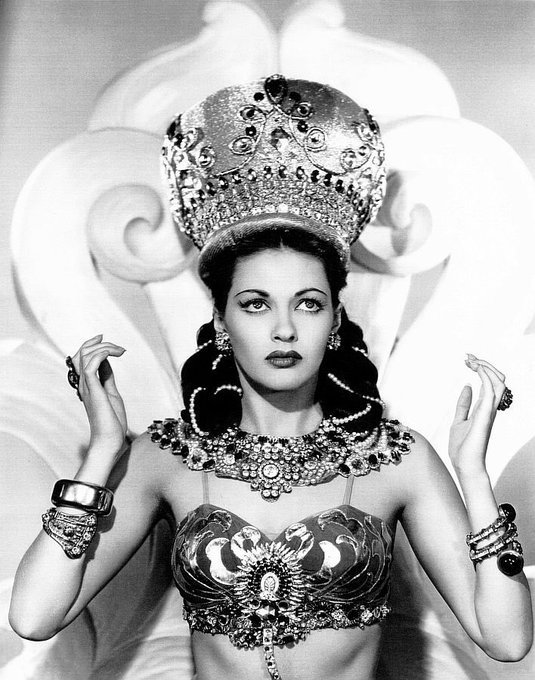
“ Yvonne De Carlo, Song of Scheherazade (1947, directed by Walter Reisch) “
Source: @HollywoodYeste1
#beauty#beautiful#sexy#seductive#vintage#glamour#celebrity#yvonne de carlo#goddess#legend#icon#old hollywood#classic beauty#movie#song of scheherazade#1947#1940s
5 notes
·
View notes
Text
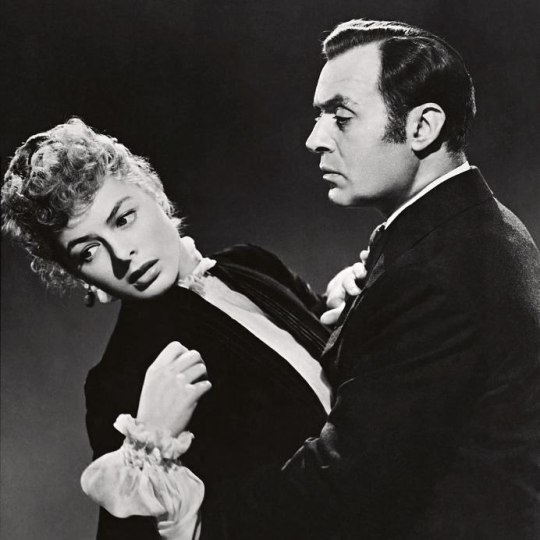
Don’t worry, we won’t question your reality. There really is a new episode out today ;)
Join us as we discuss Gaslight (1944) and try to shed some light on its more well-known progeny - ‘gaslighting’💡
(light bulb emoji)



What can adaptation theory tell us about how language evolves, the use of therapy speak, and the role of media in our understanding of medical terms? Let us enlighten you… 🕯️
(candle emoji)
🕯️💎🏚️🎶👰🧤🖼️
(candle emoji, diamond emoji, derelict house emoji, person with veil emoji, gloves emoji, framed picture emoji)
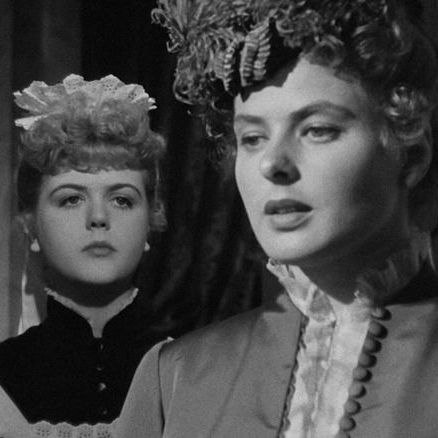
To listen, head to the link in our bio, or find us on YouTube, Spotify, or your podcasting platform of choice 🔗
(link emoji)
For German, English, Arabic and Turkish speakers (also available in simplified German and German Sign Language) in Germany please visit https://www.frauen-gegen-gewalt.de to find local support in cases of domestic violence
Episode content warnings: murder, domestic abuse and violence, emotional manipulation and gaslighting, including interpersonal, medical, political, and institutional gaslighting. Mentions of institutional racism and white supremacy. Neither of us is a mental health professional and we will be looking at these issues from a cultural perspective.
#Gaslight #Gaslighting #IngridBergman #AngelaLansbury #GeorgeCukor #Gaslight1944 #CharlesBoyer #JosephCotten #MGM
#MoviePodcast #LiliAnnaPod #LiliAnnasPrereadMediathek #queer #FeministPodcast #QueerPodcast
📝 Shownotes: 📝
📼 Preread text (Rowan Ellis, https://youtu.be/SMFll3aIbmo)
Primary Sources:
🎞️ “Gaslight” (1944) (dir. George Cukor, wr. John Van Druten, Walter Reisch, John L. Balderston) (Screenplay: https://www.scripts.com/script/gaslight_8807)
🎭 “Gas Light” (1938) (wr. Patrick Hamilton) (premiered at the Richmond Theatre in London)
🎞️ “Gaslight” (1940) (dir. Thorold Dickinson, wr. A. R. Rawlinson, Bridget Boland)
Secondary Sources:🌐 APA Dictionary of Psychology Definition of “gaslight” (dictionary.apa.org/gaslight)
📰 “Donald Trump is Gaslighting America” (2016) (Duca, Lauren) (www.teenvogue.com/story/donald-trump-is-gaslighting-america)
📼 SciShow Psych: “Gaslighting: Abuse That Makes You Question Reality” (2017) (youtu.be/ImBEhNku_YA?si=QimAV-ZdRhigQDEO)
📚“Adaptation and Appropriation” (2005) (Sanders, Julie)
📼 The Take “Gaslighting, Explained | What Does It Meme?” (2021) (youtu.be/eN4la0xOBdM?si=Fh6tClaShAVnoE8B)
🎞️ “The Truman Show” (1998) (dir. Peter Weir, wr. Andrew Niccol)
📺 “Gaslit” (2022) (Starz) (cr. Robbie Pickering, dir. Matt Ross)
📰 “The Limits of Therapy-Speak” (Volpe, Allie 2023) (www.vox.com/even-better/23769973/limits-therapy-speak-narcissist-gaslighting-trauma-toxic)
📰“‘That’s triggering!’ Is therapy-speak changing the way we talk about ourselves?” (Morgan, Eleanor 2023) (www.theguardian.com/society/2023/aug/20/triggered-toxic-narcissist-are-you-fluent-in-therapy-speak)
📰 “What is gaslighting?” (Wilkinson, Alissa 2017) (www.vox.com/culture/2017/1/21/14315372/what-is-gaslighting-gaslight-movie-ingrid-bergman)
📰 “How to Spot 'Medical Gaslighting' and What to Do About It.” (Caron, Christina) (www.nytimes.com/2022/07/29/well/mind/medical-gaslighting.html)
📺 “Live Your Own Life” (“효심이네 각자도생”) (KBS2 2023-2024)
📰 “Time Magazine 2023 Person of the Year: Taylor Swift” (Lansky, Sam) (time.com/6342806/person-of-the-year-2023-taylor-swift/)
🎙️ “Stockholm Syndrome” (2018) (You’re Wrong About Podcast)
📰 “Bystander intervention” (Wiki) (en.wikipedia.org/wiki/Bystander_intervention)
📺 “Unbelievable” (Susannah Grant, Ayelet Waldman, Michael Chabon) (2019, Netflix)
🎞️ “They Cloned Tyrone” (dir. Juel Taylor, wr. Tony Rettenmaier, Juel Taylor)
🎞️ “The Stepford Wives” (1975) (dir. Bryan Forbes, wr. William Goldman)
🎞️ “The Girl on the Train” (2016) (dir. Tate Taylor, wr. Erin Cressida Wilson)
📚 “Rosemary’s Baby” (1967) (Levin, Ira)
📚 “The Stepford Wives” (1972) (Levin, Ira)
📱Social Media Handles📱:
IG: https://www.instagram.com/liliannapod/
Twitter: https://twitter.com/liliannapod
Tumblr: https://www.tumblr.com/blog/liliannasprereadmediathek
🎹Intromusic🎹:
"Wall" by Jahzaar, licenced under Attribution-ShareAlike 4.0 International (CC BY-SA 4.0)
🎹Outro Music🎹:
“Waterbeat” by DJ Lengua, licenced under Attribution 3.0 Unported (CC BY 3.0)
🎹Transition Music🎹:
gas burning stove activation and burn by EdR from Pixabay
Old fashioned clock sound by Pixabay
Walking on wooden floorboards by Pixabay
0 notes
Text
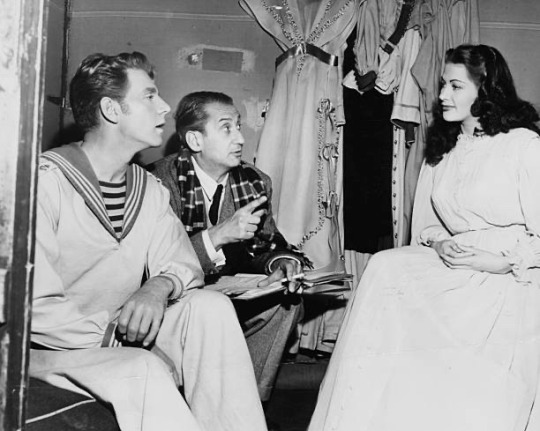
Director Walter Reisch talking to Jean-Pierre Aumont and Yvonne de Carlo on set of SONG OF SCHEHERAZADE (1947)
18 notes
·
View notes
Text
See pinned post for the full bracket!
#upset with my own bracketing for pitting two of my favorites against each other so soon 😠#best best original screenplay tournament#best original screenplay#oscars#academy awards#sunset boulevard#sunset blvd#billy wilder#charles brackett#richard l. breen#walter reisch#witness#william kelley#earl w. wallace#pamela wallace#bracket tournament#poll#polls
0 notes
Text
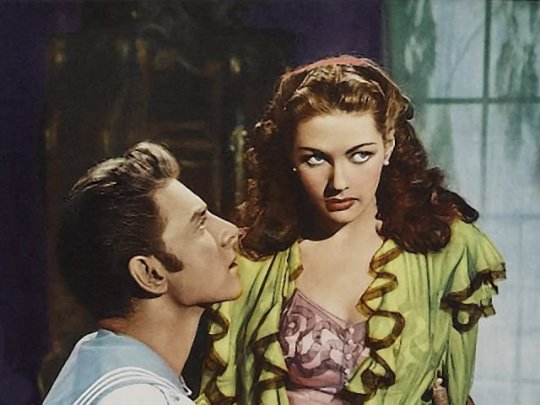
Jean Pierre Aumont-Yvonne de Carlo "Scheherezade" (Song of Scheherezade) 1947, de Walter Reisch.
24 notes
·
View notes
Text
If Peter Lorre were in "A Christmas Carol"...
...what role would he play?
(This picture is from The Mask of Dimitrios but I felt his somber expression was apt.)
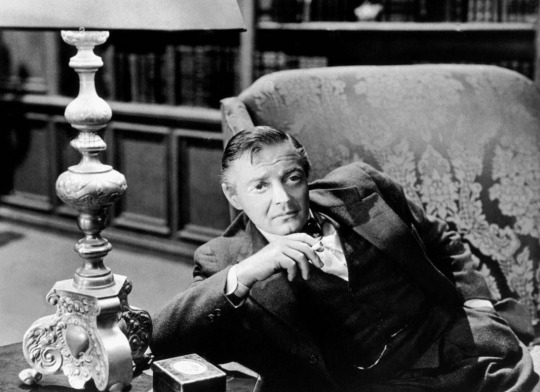
First, I feel compelled to say that for me, Alastair Sim is "the" Scrooge. He's exceptional. His face is so reflective and nuanced. His voice is resonant and gorgeous. His eyes are like great, luminous soul-windows.
So I'm not replacing Alastair at all, I am just inventing yet another Christmas Carol movie...
But would Peter play Scrooge? I like him as the lead in anything, and this would be no exception; Peter could pervade the atmosphere with remoteness and disdain, a curl of the lip, a sardonic glint in the eye, the unholy amusement at all the poor fools (literally and figuratively) surrounding him. Humanity! Bah! HUMBUG!
And then the gradual dethawing of his icy, padlocked heart, chip by chip, key-twist by key-twist, the torment and loss and longing churned up by the Ghost visits, the final terror-stricken howl, and then - ah, and then! - the utter joy (leavened with care and mindfulness) and rush to make up for all that lost time. It's delicious to contemplate.
But I also find myself quite strongly seeing Peter as Bob Cratchit. The mournful expression as he tries to warm his fingers by the single candle on his desk. The unshakeable good cheer and good personhood that pervades him. The unconditional love for his family and fellow human beings. The heart-wrenching scene over Tiny Tim. The fact that Peter would, indeed, steal every scene he was in. ❤
Let's make a list! Idle musings with creative attention to timelines include:
Scrooge - Peter Lorre or Boris Karloff or ?
Marley - Karloff or John Carradine
Cratchit - Peter or ?
Cratchit's wife - Kathleen Lockhart
Tiny Tim - Freddie Bartholomew
Nephew -
Nephew's Wife -
Scrooge's sister, Fan - Gene Tierney
Scrooge's lost love, Alice - Donna Reed
Fezziwig - Sydney Greenstreet complete with his "sir" this and "sir" that
Ghost of Christmas Past -
Ghost of Christmas Present - Eugene Pallette (okay maybe not :D)
Ghost of Christmas Future -
Scrooge's housekeeper - Elsa Lanchester
Feel free to disagree & completely jumble up the list!
Incidentally about Peter & the Cratchit role, another reason is because of this anecdote from the biography:
[Vienna, 1933, under martial law. 8 o'clock curfew. Lorre is with his friends & actors in the Majolica Hall, a subterranean Bohemian wine place where they had to get their food after curfew. To keep their spirits up against hearing all the shooting outside and police cars racing around…]
Composer Robert Stoltz said to Peter that it was funny how they always gave him parts where he plays a monster or a Greek chorus kind of thing. Why couldn't he play an important classic part?
Peter: "You are thinking of Hamlet. I know the whole play from
beginning to end, all the parts."
Another person urged Lorre to recite some of the play, yet the others felt funny about that. Screenwriter Walter Reisch said, "After all, he with his shoulders hanging down and the fat face. He was very, very overweight at the time. He looked much older than he really was."
But Peter said: "I want to do it, really. It has been deep in my heart ever since I was twelve. Ever since I ran away from home. Ever since I saw Hamlet with all the great stars of Europe, it has been the great dream of my life. If you will really keep quiet, I will give you a bit.”
Reisch and the others thought it would be nothing but a disaster.
But then:
"He didn’t start with 'To be or not to be,'" said Reisch. "He started reciting the first gravedigger from beginning to end."
After finishing, Peter scolded his audience:
"You sons-of-bitches, you thought I was going to play Hamlet and make a fool of myself. My part is the gravedigger and if I had ever played it on the stage I would have stolen that play. There would have been no Hamlet and no Claudius, no Polonius, no Laertes and no Ophelia. It would have been me."
Reisch said: "It was terrific. After the first lines he got up and took a knife, as if it were the gravedigger’s spade, and he started to dig into the earth. You forgot the shooting outside, you forgot the Majolica Hall, you forgot everything. You forgot Hitler. You forgot Hamlet. You saw Peter Lorre as the gravedigger and that showed to me this guy knew his limitations, and at the same time made the best of his shortcomings, his figure, his funny face, his reputation as a monster."
--
I'd be inclined to say Peter didn't really have limitations, just what others put upon him.
Incidentally, I saw this: "According to an essay by Dave Duggins on the Web site Horror-Wood, 1947 nearly brought us A Universal Horror Christmas Carol, which would have featured such stars of classic Universal Pictures horror movies as Boris Karloff (playing Scrooge), Bela Lugosi (as the Ghost of Christmas Past) and John Carradine (as the Ghost of Christmas Future, aka the Grim Reaper). For script excerpts, go to www.horror-wood.com/carol.htm." Source - of the quote; the website referenced doesn't seem to exist anymore.
--
I leave you with a PSA: There is ample time to subscribe to A Dickens December, created by @warrioreowynofrohan, which releases a portion of the book each day from December 1st to December 26.
It's really, really lovely to read this as a serial. No offense to Dickens, who went through a small slice of hell to publish it solely as a novella; my enjoyment is possibly because I'm oversaturated with unrestricted binge access to just about everything else. (I am appreciating "The Peripheral," which is awesome, being a weekly release.)
I had completely forgotten so many devilish lines that you don't get in dramatic readings/movies:
"Don't be angry, uncle. Come! Dine with us to-morrow."
Scrooge said that he would see him—yes, indeed he did. He went the whole length of the expression, and said that he would see him in that extremity first.
And the beauty of lines such as:
The brightness of the shops, where holly sprigs and berries crackled in the lamp heat of the windows, made pale faces ruddy as they passed.
9 notes
·
View notes
Text
hollywood's happiest couple
the films of billy wilder (writer&director) and charles brackett (writer&producer)

Bluebeard’s Eighth Wife (1938).
Director: Ernst Lubitsch.
Cast: Claudette Colbert. Gary Cooper. Edward Everett Horton. David Niven.
Screenplay: Charles Brackett and Billy Wilder. From the play by Alfred Savoir; English-language adaptation by Charlton Andrews.
That Certain Age (1938).
Director: Edward Ludwig.
Cast: Deanna Durbin. Melvyn Douglas. Jackie Cooper. Nancy Carroll. Irene Rich.
Screenplay: Bruce Manning. From an original story by F. Hugh Herbert. Charles Brackett and Billy Wilder received no screen credit for their work on That Certain Age.
Ninotchka (1939).
Director: Ernst Lubitsch.
Cast: Greta Garbo. Melvyn Douglas. Ina Claire. Bela Lugosi.
Screenplay: Charles Brackett, Billy Wilder, and Walter Reisch. From an original story by Melchior Lengyel.
Midnight (1939).
Director: Mitchell Leisen.
Cast: Claudette Colbert. Don Ameche. John Barrymore. Mary Astor.
Screenplay: Charles Brackett and Billy Wilder. From a story by Edwin Justus Mayer and Franz Schulz.
What a Life (1939).
Director: Theodore Reed.
Cast: Jackie Cooper. Betty Field. John Howard. Janice Logan.
Screenplay: Charles Brackett and Billy Wilder. From the play by Clifford Goldsmith.
Arise, My Love (1940).
Director: Mitchell Leisen.
Cast: Claudette Colbert. Ray Milland. Dennis O’Keefe. Walter Abel.
Screenplay: Charles Brackett and Billy Wilder. Adaptation by Jacques Théry, itself from an original story by Hans Székely and Benjamin Glazer.
French Without Tears (1940).
Director: Anthony Asquith.
Cast: Ray Milland. Ellen Drew. Janine Darcey. David Tree. Roland Culver.
Screenplay: Ian Dalrymple, Terence Rattigan, and Anatole de Grunwald. Brackett and Wilder worked on the story treatment.
Ball of Fire (1941).
Director: Howard Hawks.
Cast: Gary Cooper. Barbara Stanwyck. Oskar Homolka. Henry Travers. S.Z. Sakall.
Screenplay: Charles Brackett and Billy Wilder. From an original story by Wilder and Thomas Monroe.
Hold Back the Dawn (1941).
Director: Mitchell Leisen.
Cast: Charles Boyer. Olivia de Havilland. Paulette Goddard.
Screenplay: Charles Brackett and Billy Wilder. From Ketti Frings’ story “Memo to a Movie Producer.”
The Major and the Minor (1942).
Director: Billy Wilder.
Cast: Ginger Rogers. Ray Milland. Rita Johnson. Robert Benchley. Diana Lynn.
Screenplay: Charles Brackett and Billy Wilder. From the play by Edward Childs Carpenter, itself based on a story by Fanny Kilbourne.
Five Graves to Cairo (1943).
Director: Billy Wilder.
Associate Prod.: Charles Brackett.
Cast: Franchot Tone. Anne Baxter. Akim Tamiroff. Erich von Stroheim. Peter van Eyck.
Screenplay: Charles Brackett and Billy Wilder. From the play by Lajos Biró.
The Lost Weekend (1945).
Director: Billy Wilder.
Prod.: Charles Brackett.
Cast: Ray Milland. Jane Wyman. Phillip Terry. Howard Da Silva. Doris Dowling. Frank Faylen.
Screenplay: Charles Brackett and Billy Wilder. From the novel by Charles R. Jackson.
The Bishop’s Wife (1947).
Director: Henry Koster.
Cast: Cary Grant. Loretta Young. David Niven. Gladys Cooper. Monty Woolley. James Gleason. Elsa Lanchester.
Screenplay: Robert E. Sherwood and Leonardo Bercovici. From the novel by Robert Nathan.
Charles Brackett and Billy Wilder received no screen credit for their work on The Bishop’s Wife.
A Foreign Affair (1948).
Director: Billy Wilder.
Prod.: Charles Brackett.
Cast: Jean Arthur. Marlene Dietrich. John Lund. Millard Mitchell.
Screenplay: Charles Brackett, Billy Wilder, and Richard L. Breen. Adaptation by Robert Harari. From an original story by David Shaw.
The Emperor Waltz (1948).
Director: Billy Wilder.
Prod.: Charles Brackett.
Cast: Bing Crosby. Joan Fontaine. Roland Culver.
Screenplay: Charles Brackett and Billy Wilder.
Sunset Blvd. (1950).
Director: Billy Wilder.
Prod.: Charles Brackett.
Cast: William Holden. Gloria Swanson. Erich von Stroheim. Nancy Olson. Fred Clark. Cameos: Hedda Hopper. Cecil B. DeMille. Anna Q. Nilsson. Buster Keaton. H.B. Warner.
Screenplay: Charles Brackett, Billy Wilder, and D.M. Marshman Jr.
1 note
·
View note
Photo
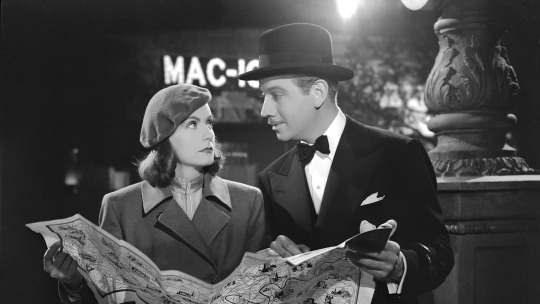
Ninotchka https://bit.ly/3OG7kPI Because Ninotchka stars Greta Garbo, was directed by Ernst Lubitsch and was written by the great Billy Wilder and Charles Brackett, along with Walter Reisch, it tends to get an easy ride when talk turns to the momentous American films of t...
0 notes